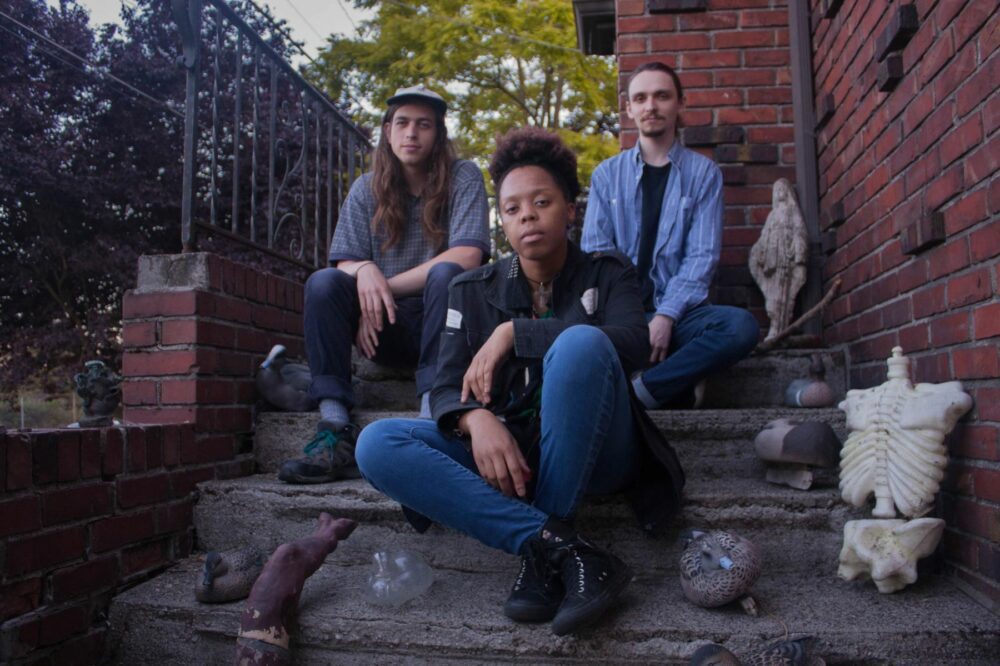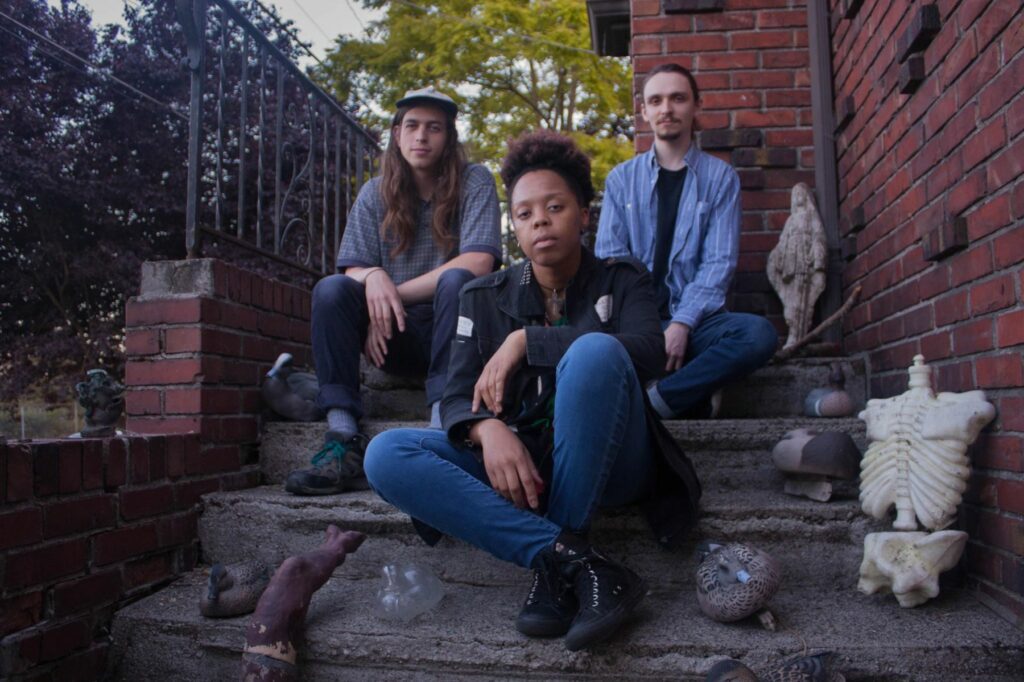

Gunk pop. That’s the phrase Nicolle Swims—lead singer, guitarist and songwriter for Seattle band Black Ends—coined to describe the group’s distinctive ruckus, which builds on Seattle’s alternative rock history but signifies a new and more diverse era for Seattle rock music. “I feel like my voice is kind of gunky,” Swims explains. “My guitar pedals can be pretty gross and weird sounding too.”
Comprised of Swims, as well as bassist and keys player Ben Swanson and drummer Jonny Modes, Black Ends released their most recent EP, Stay Evil, last summer. Swims says the band is currently working on a new music for an LP they hope to release and tour with soon.
The resemblance between gunk pop and grunge can’t be denied, and sure enough, Black Ends—who play one of their first shows back since quarantine at Fremont’s Substation this Saturday—spring from the same twisted sense of humor that fueled the genius of Kurt Cobain and several decades of white-dude Nirvana copycats. While Swims cites Nirvana as her favorite band of all time, there’s nothing cliché about Black Ends. Swims expands the definition of the Seattle sound simply by being herself.
Swims grew up in Federal Way, a city of about 100,000 people located just south of Seattle. She played saxophone in high school band, which she admits she “sucked at,” because she really wanted to play guitar. “I’ve always loved that instrument and grew up loving it,” she recalls. “My mom bought me a guitar and I started taking guitar lessons and I loved it so much.”
Graduating from high school in the nearby town of Burien, Swims went on to pursue a music degree at The University of Idaho, while her family relocated to Alabama. “I didn’t like that college; I wanted to move back with my parents for a little bit, so I went to school in Alabama and just played at open mics there for like six years,” says Swims. But she desperately wanted to return to Seattle, saying, “I missed it a lot.”
In 2018, after studying classical guitar at the University of Alabama-Huntsville, Swims moved back to Seattle with the intent of starting her band. She already had some original music written, and had also conceived a name for the project.
“I had a book on the end of my bookshelf called Black and I was like, that’s a cool band name: Black Ends,” she says. “It was super simple. Everyone thinks it’s about death or something. It was just a book on the end of my shelf – a really cool book by Deborah Willis, a celebration of Black culture.”
That simple inspiration is partly what makes Black Ends’ music so fresh and important—it challenges Seattle’s predominantly white alternative rock idiom by situating Swims, a BIPOC woman, front and center. The rise of Black Ends represents a growing community of POC-led rock bands in Seattle.
“Before the pandemic, I used to get together with Alaia from Tres Leches, Eva from the Black Tones, Shaina Shepherd, and SassyBlack,” says Swims. “[Seeing more BIPOC-led bands in Seattle] makes me feel very good, like we’re doing something right. And I’ve seen, online, more Black girls are playing rock music than ever, and it’s really awesome.”
The growing prevalence of Black womxn artists in Seattle rock is largely due to the on-the-ground work of bands like SassyBlack and The Black Tones, who repeatedly highlight Blackness and the Black roots of rock music in their work—a torch that Swims also carries, while noting there’s a lot more work the community could do, too.
“I feel like there should be more Black bands getting booked in general,” she says. “I feel like there shouldn’t be all-white boy bands anymore, like the shows that are all white boy bands. That’s just over.”
It is over, and Swims’ quirky sense of songwriting, raspy voice, and Nina Simone-meets-Kurt Cobain vibe, which makes for some of the most innovative music Seattle’s seen in years, is a breath of fresh air.
“I mean, I have a lot of influences, ” Swims points out. “James Baldwin, I love his writing a lot. Nina Simone, I really love her. Jeff Buckley, he’s one of my favorite singers ever. I really like Elliot Smith a lot too.”
Despite the global pandemic, Black Ends have only gained momentum and notoriety throughout Seattle, to the point that they’re now playing fancy parties with bands like Childbirth, a Seattle supergroup made up of Julia Shapiro of Chastity Belt, Bree McKenna of Tacocat, and Stacy Peck of Pony Time, as well as one of Seattle’s up-and-coming festivals, Fisherman’s Village Music Festival, where they’ll play September 11th at midnight. This Saturday, they play alongside Actionesse, a 5-piece horncore band that’s earned nods from The Seattle Times and NPR’s All Songs Considered.
“More people started asking us to play as the days went by – I guess, word of mouth, people heard about Black Ends, and realized we weren’t bad, so they started asking us to play shows in Seattle. We never really had to ask people to give us shows,” says Swims. “I’m having a great time.”
Follow Black Ends on Instagram and Facebook for ongoing updates.

